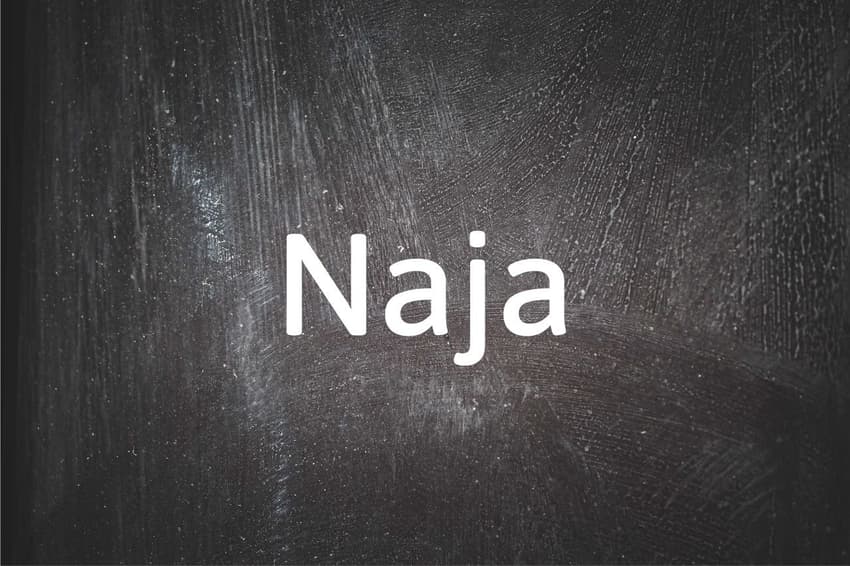German word of the day: Naja

Naja, we look at one of the most widely used German particles.
Austrians have a habit of using a lot of particles – which again and again confuse non-native speakers. Naja one of the other tricky ones.
Picture this: You are talking to someone in German. The conversation goes like this: Your conversation partner tells you a rather long story and ends it with “Naja, und dann habe ich ihr gesagt, dass sie nicht zurück zu kommen braucht.” (“Well, and then I told her that she doesn’t have to bother coming back.”) In this case, your conversation partner used one of the most infamous German particles.
Naja, or na ja can be translated to “well” and is an interjection, which means it’s used to express a feeling. In the case of na ja, it’s used to express either agreement or doubt.
READ ALSO: Ten pieces of Austrian slang you’ll never learn in class
Two examples for its use are the following:
To tell the person you’re talking to that you agree with their statement, but have something more to say: “Na ja, ich stimme dir zu, aber…” (“Well, I agree with you, but…”)
To wrap up a long story with a final statement: “Na ja, das war jetzt eine lange Geschichte, aber alles in allem finde ich es blöd.” (“Well, this was a long story, but all in all it really upsets me.”)
Na ja consists of the words na and ja, ja meaning “yes” and na being a totally different case. So let me explain.
Na is a short particle that you will probably stumble across many, many times while in Austria. If you look it up, the dictionary Duden explains na like this:
“A particle preceding a [shortened] sentence and creating the emotional transition of something, which preceded the sentence as something spoken, occurred or thought, to a concluding statement, which may contain personal feelings, but especially the impatience, dissatisfaction, resignation, rejection, but also surprise, a request, encouragement or joy.”
What a mouthful. A shorter explanation is probably: Na is a particle that can be used in basically any context.
READ ALSO: Beatles to Bowie: How pop stars can help you master German grammar
Here are some examples to showcase this:
Na, wie geht es dir? – “Hi, how are you?”
Na, das ist ja super gelaufen. – “Well that went great.” (ironically)
Na so was! – “How strange!”
Na schön. – “Very well.”
Na, dann mal los! – “Well then, let’s go!”
Na endlich! – “Finally!”
Na, jetzt mach mal nicht so ein Theater. – “Now, stop making such a fuss about it.”
So, if you want to sound like you’ve been speaking German all your life, casually start using na or na ja in your sentences. People will be impressed.
Comments
See Also
Austrians have a habit of using a lot of particles – which again and again confuse non-native speakers. Naja one of the other tricky ones.
Picture this: You are talking to someone in German. The conversation goes like this: Your conversation partner tells you a rather long story and ends it with “Naja, und dann habe ich ihr gesagt, dass sie nicht zurück zu kommen braucht.” (“Well, and then I told her that she doesn’t have to bother coming back.”) In this case, your conversation partner used one of the most infamous German particles.
Naja, or na ja can be translated to “well” and is an interjection, which means it’s used to express a feeling. In the case of na ja, it’s used to express either agreement or doubt.
READ ALSO: Ten pieces of Austrian slang you’ll never learn in class
Two examples for its use are the following:
To tell the person you’re talking to that you agree with their statement, but have something more to say: “Na ja, ich stimme dir zu, aber…” (“Well, I agree with you, but…”)
To wrap up a long story with a final statement: “Na ja, das war jetzt eine lange Geschichte, aber alles in allem finde ich es blöd.” (“Well, this was a long story, but all in all it really upsets me.”)
Na ja consists of the words na and ja, ja meaning “yes” and na being a totally different case. So let me explain.
Na is a short particle that you will probably stumble across many, many times while in Austria. If you look it up, the dictionary Duden explains na like this:
“A particle preceding a [shortened] sentence and creating the emotional transition of something, which preceded the sentence as something spoken, occurred or thought, to a concluding statement, which may contain personal feelings, but especially the impatience, dissatisfaction, resignation, rejection, but also surprise, a request, encouragement or joy.”
What a mouthful. A shorter explanation is probably: Na is a particle that can be used in basically any context.
READ ALSO: Beatles to Bowie: How pop stars can help you master German grammar
Here are some examples to showcase this:
Na, wie geht es dir? – “Hi, how are you?”
Na, das ist ja super gelaufen. – “Well that went great.” (ironically)
Na so was! – “How strange!”
Na schön. – “Very well.”
Na, dann mal los! – “Well then, let’s go!”
Na endlich! – “Finally!”
Na, jetzt mach mal nicht so ein Theater. – “Now, stop making such a fuss about it.”
So, if you want to sound like you’ve been speaking German all your life, casually start using na or na ja in your sentences. People will be impressed.
Join the conversation in our comments section below. Share your own views and experience and if you have a question or suggestion for our journalists then email us at [email protected].
Please keep comments civil, constructive and on topic – and make sure to read our terms of use before getting involved.
Please log in here to leave a comment.